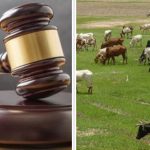The Federal High Court in Abuja has upheld the right of Nigerian states to enact anti-grazing legislation in their jurisdictions.
This stance weakens that of the Attorney-General of the Federation, Abubakar Malami, who previously stated that such a ban is illegal and violates the nation’s laws on freedom of movement.
This was made clear by the court’s rejection of a suit seeking to compel President Muhammadu Buhari to direct security agencies to enforce the Benue Open Grazing Prohibition and Ranching Law of 2017.
The judge, Ijeoma Ojukwu, ruled that the court lacked jurisdiction to hear the case in her decision delivered during virtual proceedings.
The judge, in the judgement, also said the enforcement of the anti-grazing law having been validly passed by the Benue House of Assembly, for instance, “lies with the state government”.
In dismissing the suit, the judge stated that the matter is not justiciable, implying that a court of law cannot rule on it.
She said ‘It’s matter of misconduct not triable by court’
“In my view, the courts do not have the jurisdiction to entertain any suit bordering on compliance with the oath of office of the president for the reason that it is not justiciable.
The Federal High Court in Abuja has upheld the right of Nigerian states to enact anti-grazing legislation in their jurisdictions.
This stance weakens that of the Attorney-General of the Federation, Abubakar Malami, who previously stated that such a ban is illegal and violates the nation’s laws on freedom of movement.
This was made clear by the court’s rejection of a suit seeking to compel President Muhammadu Buhari to direct security agencies to enforce the Benue Open Grazing Prohibition and Ranching Law of 2017.
The judge, Ijeoma Ojukwu, ruled that the court lacked jurisdiction to hear the case in her decision delivered during virtual proceedings.
The judge, in the judgement, also said the enforcement of the anti-grazing law having been validly passed by the Benue House of Assembly, for instance, “lies with the state government”.
In dismissing the suit, the judge stated that the matter is not justiciable, implying that a court of law cannot rule on it.
She said ‘It’s matter of misconduct not triable by court’
“In my view, the courts do not have the jurisdiction to entertain any suit bordering on compliance with the oath of office of the president for the reason that it is not justiciable.
The Federal High Court in Abuja has upheld the right of Nigerian states to enact anti-grazing legislation in their jurisdictions.
This stance weakens that of the Attorney-General of the Federation, Abubakar Malami, who previously stated that such a ban is illegal and violates the nation’s laws on freedom of movement.
This was made clear by the court’s rejection of a suit seeking to compel President Muhammadu Buhari to direct security agencies to enforce the Benue Open Grazing Prohibition and Ranching Law of 2017.
The judge, Ijeoma Ojukwu, ruled that the court lacked jurisdiction to hear the case in her decision delivered during virtual proceedings.
The judge, in the judgement, also said the enforcement of the anti-grazing law having been validly passed by the Benue House of Assembly, for instance, “lies with the state government”.
In dismissing the suit, the judge stated that the matter is not justiciable, implying that a court of law cannot rule on it.
She said ‘It’s matter of misconduct not triable by court’
“In my view, the courts do not have the jurisdiction to entertain any suit bordering on compliance with the oath of office of the president for the reason that it is not justiciable.
The Federal High Court in Abuja has upheld the right of Nigerian states to enact anti-grazing legislation in their jurisdictions.
This stance weakens that of the Attorney-General of the Federation, Abubakar Malami, who previously stated that such a ban is illegal and violates the nation’s laws on freedom of movement.
This was made clear by the court’s rejection of a suit seeking to compel President Muhammadu Buhari to direct security agencies to enforce the Benue Open Grazing Prohibition and Ranching Law of 2017.
The judge, Ijeoma Ojukwu, ruled that the court lacked jurisdiction to hear the case in her decision delivered during virtual proceedings.
The judge, in the judgement, also said the enforcement of the anti-grazing law having been validly passed by the Benue House of Assembly, for instance, “lies with the state government”.
In dismissing the suit, the judge stated that the matter is not justiciable, implying that a court of law cannot rule on it.
She said ‘It’s matter of misconduct not triable by court’
“In my view, the courts do not have the jurisdiction to entertain any suit bordering on compliance with the oath of office of the president for the reason that it is not justiciable.
The Federal High Court in Abuja has upheld the right of Nigerian states to enact anti-grazing legislation in their jurisdictions.
This stance weakens that of the Attorney-General of the Federation, Abubakar Malami, who previously stated that such a ban is illegal and violates the nation’s laws on freedom of movement.
This was made clear by the court’s rejection of a suit seeking to compel President Muhammadu Buhari to direct security agencies to enforce the Benue Open Grazing Prohibition and Ranching Law of 2017.
The judge, Ijeoma Ojukwu, ruled that the court lacked jurisdiction to hear the case in her decision delivered during virtual proceedings.
The judge, in the judgement, also said the enforcement of the anti-grazing law having been validly passed by the Benue House of Assembly, for instance, “lies with the state government”.
In dismissing the suit, the judge stated that the matter is not justiciable, implying that a court of law cannot rule on it.
She said ‘It’s matter of misconduct not triable by court’
“In my view, the courts do not have the jurisdiction to entertain any suit bordering on compliance with the oath of office of the president for the reason that it is not justiciable.
The Federal High Court in Abuja has upheld the right of Nigerian states to enact anti-grazing legislation in their jurisdictions.
This stance weakens that of the Attorney-General of the Federation, Abubakar Malami, who previously stated that such a ban is illegal and violates the nation’s laws on freedom of movement.
This was made clear by the court’s rejection of a suit seeking to compel President Muhammadu Buhari to direct security agencies to enforce the Benue Open Grazing Prohibition and Ranching Law of 2017.
The judge, Ijeoma Ojukwu, ruled that the court lacked jurisdiction to hear the case in her decision delivered during virtual proceedings.
The judge, in the judgement, also said the enforcement of the anti-grazing law having been validly passed by the Benue House of Assembly, for instance, “lies with the state government”.
In dismissing the suit, the judge stated that the matter is not justiciable, implying that a court of law cannot rule on it.
She said ‘It’s matter of misconduct not triable by court’
“In my view, the courts do not have the jurisdiction to entertain any suit bordering on compliance with the oath of office of the president for the reason that it is not justiciable.
The Federal High Court in Abuja has upheld the right of Nigerian states to enact anti-grazing legislation in their jurisdictions.
This stance weakens that of the Attorney-General of the Federation, Abubakar Malami, who previously stated that such a ban is illegal and violates the nation’s laws on freedom of movement.
This was made clear by the court’s rejection of a suit seeking to compel President Muhammadu Buhari to direct security agencies to enforce the Benue Open Grazing Prohibition and Ranching Law of 2017.
The judge, Ijeoma Ojukwu, ruled that the court lacked jurisdiction to hear the case in her decision delivered during virtual proceedings.
The judge, in the judgement, also said the enforcement of the anti-grazing law having been validly passed by the Benue House of Assembly, for instance, “lies with the state government”.
In dismissing the suit, the judge stated that the matter is not justiciable, implying that a court of law cannot rule on it.
She said ‘It’s matter of misconduct not triable by court’
“In my view, the courts do not have the jurisdiction to entertain any suit bordering on compliance with the oath of office of the president for the reason that it is not justiciable.
The Federal High Court in Abuja has upheld the right of Nigerian states to enact anti-grazing legislation in their jurisdictions.
This stance weakens that of the Attorney-General of the Federation, Abubakar Malami, who previously stated that such a ban is illegal and violates the nation’s laws on freedom of movement.
This was made clear by the court’s rejection of a suit seeking to compel President Muhammadu Buhari to direct security agencies to enforce the Benue Open Grazing Prohibition and Ranching Law of 2017.
The judge, Ijeoma Ojukwu, ruled that the court lacked jurisdiction to hear the case in her decision delivered during virtual proceedings.
The judge, in the judgement, also said the enforcement of the anti-grazing law having been validly passed by the Benue House of Assembly, for instance, “lies with the state government”.
In dismissing the suit, the judge stated that the matter is not justiciable, implying that a court of law cannot rule on it.
She said ‘It’s matter of misconduct not triable by court’
“In my view, the courts do not have the jurisdiction to entertain any suit bordering on compliance with the oath of office of the president for the reason that it is not justiciable.














